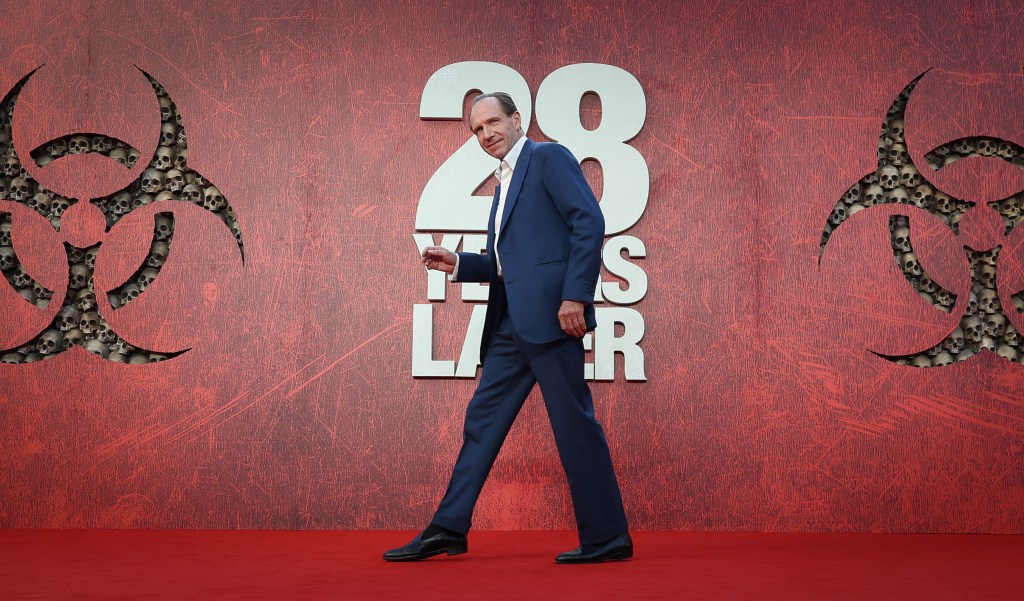Was anyone out there desperate for a third instalment of the 28 Days Later series? It has been nearly two decades since 28 Weeks Later. Many who were once thrilled to the adventures of hapless humans attempting to dodge the ravages of surprisingly fast-moving zombies have moved onto other genre fare, not least The Last of Us. However, the astonishingly visceral trailers for 28 Years Later, soundtracked by a vintage audio recording of Rudyard Kipling’s poem ‘Boots’, were some of the most compelling and attention-grabbing trailers ever made. So does the film live up to its advertisements?
Thankfully, it does. It’s probably Danny Boyle’s most accomplished picture since 2007’s Sunshine, and shows the now 68 year-old director’s almost casual proficiency at building tension and horror, as well as more unexpected moments of tenderness and beauty. It helps that he has reunited with his regular collaborator Alex Garland, who also wrote 28 Days Later, and the two men have a wide assortment of surprises in their toolbox.
If you want a darkly pointed satire on Brexit and Covid, you’ve got it, but if you want unbearably tense, beautifully shot (on a converted iPhone, continuing the lo-fi digital look of the original) and Wagner-scored chase sequences, you’ve got that, too. Then there’s an astonishing ending that I am forbidden to say anything about, courtesy of the distributors’ edict. Although it may not mean as much to viewers in the United States as it does in the film’s native Britain, it still ends the picture with a visceral, blackly hilarious jolt.
28 Years Later begins as an unsettlingly assured piece of folk horror, with nods to The Wicker Man and its ilk. Britain has long been abandoned to the “infected,” who roam the deceptively bucolic countryside looking for fresh meat to feed upon. The only survivors who are leading something approximating a normal life are a group of a few thousand people who live in a small, isolated community off the coast of North-East England, without electricity or technology and in a state of self-sufficiency. In order to maintain this, its men and boys must make occasional visits to the mainland, armed with bows and arrows, in order to retrieve fuel. Along the way, boys are expected to kill the infected to show their manliness, and also to demonstrate that they will be able to protect their community should the time come.
The film’s true protagonist is Spike (Alfie Williams), a 12-year old boy who is travelling with his gruff, alpha male father Jamie (a surprisingly bearable Aaron Taylor-Johnson) across to the mainland for the first time, leaving his mother Isla (Jodie Comer), who appears to be in the grip of some kind of violent and debilitating depression. The initial foray goes as planned, albeit with a narrow escape at the end, but the glimpsed spectacle of the apparently Colonel Kurtz-like figure of Dr Kelson (Ralph Fiennes), a survivor who has long since gone native, leads Spike to ask questions. He decides to return to the mainland, and then things get strange.
There are zombie attacks by the bucketload, and if you’ve seen the first film in the series, you’ll know what to expect. (One grim evolution: there are now alpha infected, who have the ability to rip human heads, complete with spinal cords, from shoulders.) But what is welcome here is not simply the depiction of throat-slitting, chest-popping violence, but the surprising degree of emotional depth on offer, as well as some genuinely laugh-out-loud moments that allow the audience to switch from horror to hilarity and back again. Comer is superb in a very difficult role. Fiennes is dependably magnificent as the apparently insane doctor, who might be far more attuned to what’s going on than anyone else. Williams is – as often with Boyle – a proper find.
In a summer full of witless, unnecessary sequels and remakes, 28 Years Later is the real thing: a scary movie that will make you think, even as you shudder. And then, of course, there’s the last few moments. But that’s enough said about them, and the surprise last-minute cameo. Watch it for yourself, and then wait for next January’s sequel, The Bone Temple. If it’s anything as good as this movie, a treat awaits.

















Leave a Reply